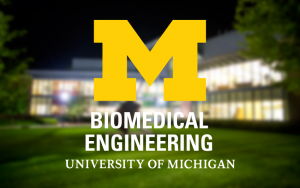Presented By: Biomedical Engineering
BME Master's Defense: Akiho Suzuki
Computational prediction of drug combinations against Pseudomonas aeruginosa using chemogenomics

Pseudomonas aeruginosa is one of the most common gram-negative bacteria associated with severe infections in hospitals. In the U.S., there are 51,000 P. aeruginosa infections, and about 440 deaths occur each year. The common treatment method for the infection is antibiotics, but antibiotic treatment has been becoming more and more challenging today due to the development of antibiotic resistance.
As a potential solution for this problem, combination antibiotic therapy has been widely studied as a useful method to treat multidrug-resistant bacterial pathogens. The advantages of combination antibiotic therapy over monotherapy include not only prevention of development of resistance during therapy, but also potential synergetic effect over the original potency of each of the antibiotics. Therefore, combination antibiotics therapy may result in a more efficient treatment of P. aeruginosa in addition to preventing resistance development. However, although some efforts have been made to investigate the best drug combinations to treat P. aeruginosa infections, it is almost impossible to test combinations of every single type of existing antibiotic experimentally considering the time and cost.
In this project, we used a machine learning software, called INDIGO, to predict drug interactions of antibiotic combinations against P. aeruginosa with a motivation to develop more effective treatments. INDIGO uses chemogenomics data and known experimental drug interaction scores to predict synergetic and antagonistic effects of new antibiotics combinations. We then assessed the accuracy of INDIGO performance by comparing the prediction results with the experimental data. INDIGO demonstrated high prediction accuracy for almost 200 new drug pairs with more than 40 different drugs. In the future, the INDIGO algorithm will be applied to predict the effect of drug combinations on various drug-resistant strains of P. aeruginosa.
As a potential solution for this problem, combination antibiotic therapy has been widely studied as a useful method to treat multidrug-resistant bacterial pathogens. The advantages of combination antibiotic therapy over monotherapy include not only prevention of development of resistance during therapy, but also potential synergetic effect over the original potency of each of the antibiotics. Therefore, combination antibiotics therapy may result in a more efficient treatment of P. aeruginosa in addition to preventing resistance development. However, although some efforts have been made to investigate the best drug combinations to treat P. aeruginosa infections, it is almost impossible to test combinations of every single type of existing antibiotic experimentally considering the time and cost.
In this project, we used a machine learning software, called INDIGO, to predict drug interactions of antibiotic combinations against P. aeruginosa with a motivation to develop more effective treatments. INDIGO uses chemogenomics data and known experimental drug interaction scores to predict synergetic and antagonistic effects of new antibiotics combinations. We then assessed the accuracy of INDIGO performance by comparing the prediction results with the experimental data. INDIGO demonstrated high prediction accuracy for almost 200 new drug pairs with more than 40 different drugs. In the future, the INDIGO algorithm will be applied to predict the effect of drug combinations on various drug-resistant strains of P. aeruginosa.